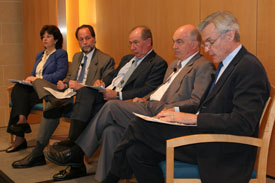
- Watch Rodrigo de Rato's keynote address, Renewing the IMF's Commitment to Low-Income Countries.
The head of the International Monetary Fund said he will propose giving developing countries a greater say in how the IMF is run. IMF Managing Director Rodrigo de Rato said that he would put forward the proposals to increase developing country representation on the Fund’s board ahead of the Annual Meetings of the IMF and the World Bank in Singapore in September.
De Rato spoke at a CGD event Monday in which he reaffirmed the IMF's commitment to assisting low-income countries. He said that the IMF would focus on its core macroeconomic expertise: helping poor countries to avoid falling back into excessive debt and to manage increases in aid.
He also repeated a pledge to address calls by low-income countries and emerging markets for greater representation in the Fund. "Low-income countries as well as clearly under-represented emerging market economies have reason to be concerned about their voice and representation in the Fund," he said.
"I will be making specific proposals on how to take these governance issues forward in the run-up to our Annual Meetings in September in Singapore, and I hope to secure the support of the membership for these," he said.
Kemal Dervis, the administrator of the United Nations Development Programme (UNDP), welcomed de Rato's reaffirmation of the IMF's involvement in low-income countries and the pledge to address governance issues. "I strongly welcome the managing director's words…on governance, voice and greater weight for poor countries in the IMF board," he said.
Dervis, a former CGD non-resident fellow, is the author of A Better Globalization: Legitimacy, Governance, and Reform. De Rato first announced plans to increase developing country representation on the Fund’s board at the 2006 Spring Meetings.

De Rato's reaffirmation of the Fund's interest in helping low-income countries comes at a time when improved macroeconomic policies in many poor countries mean less demand for IMF bailouts and supervision, and as a shift from loans to grants has led some people to question whether the IMF still needs to be actively engaged in poor countries.
"The Fund has already made an important contribution to lowering debt," de Rato said in his speech, Renewing the IMF’s Commitment to Low-Income Countries. "However, the Fund still has another important task before it: to ensure that there is not another debt crisis."
To avoid another debt crisis, the international community must offer poor countries alternative financing, he said. "It is important that the international community address the urgent needs of the low-income countries by offering sufficient grants and highly-concessional loans to enable them to finance development without relying on expensive loans," he said.
For developing countries to be able to plan effectively, such aid should be more predictable and should be delivered more efficiently, he said. He added that the Fund could help by advising poor countries on how to deal with potential risks from higher aid, including undue currency appreciation and higher inflation.
Like Dervis, the other two panelists--Ricardo Hausmann, director of the Center for International Development at Harvard University, and CGD vice president Dennis de Tray--also welcomed the IMF reaffirmation of support for low-income countries.
Hausmann, who previously served as chair of the IMF-World Bank Development Committee, the main intergovernmental coordinating body for the two global financial institutions, argued that the Fund's strategy for poor countries focuses too much on poverty reduction and the Millennium Development Goals and not enough on economic growth.
De Tray, who served as IMF resident representative in Viet Nam in the 1990s, and recently as World Bank country director for the Central Asian Republics, questioned whether the Fund could become open to learning and flexible enough at the country level to become a valued partner. Such changes in the culture of the IMF would take many years, he said.
Following questions from the floor, CGD senior fellow Liliana Rojas-Suarez, who moderated the discussion, summed up the views of the panel and the audience in just two words. "Welcome and caution," she said. "Welcome to your efforts… and caution because people still question the extent to which the current institutional environment can change as quickly as you would like."
- *Watch Rodrigo de Rato' keynote address, Renewing the IMF's Commitment to Low-Income Countries. (If you are having problems streaming the video it is also available for download. [98 MB] )
Access the full text transcript
*(If you do not have Quicktime player on your computer download it for free)

